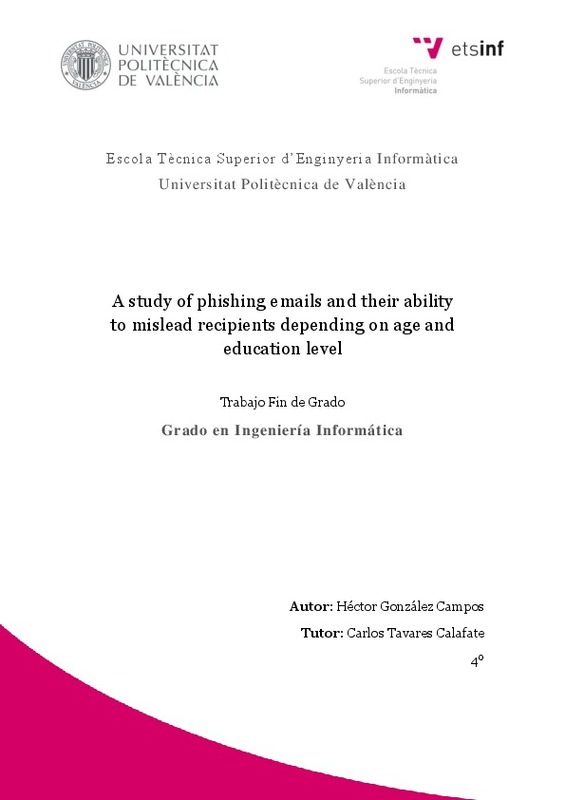JavaScript is disabled for your browser. Some features of this site may not work without it.
Buscar en RiuNet
Listar
Mi cuenta
Estadísticas
Ayuda RiuNet
Admin. UPV
A study of phishing emails and their ability to mislead recipients depending on age and education level
Mostrar el registro sencillo del ítem
Ficheros en el ítem
| dc.contributor.advisor | Tavares de Araujo Cesariny Calafate, Carlos Miguel
|
es_ES |
| dc.contributor.advisor | Bosk, Daniel
|
es_ES |
| dc.contributor.author | González Campos, Héctor
|
es_ES |
| dc.date.accessioned | 2021-10-28T07:30:28Z | |
| dc.date.available | 2021-10-28T07:30:28Z | |
| dc.date.created | 2021-10-08 | |
| dc.date.issued | 2021-10-28 | es_ES |
| dc.identifier.uri | http://hdl.handle.net/10251/175742 | |
| dc.description.abstract | [EN] Today, virtually every individual with access to an Internet connection also has a personal email address. This has made it easier for companies, for example, to market their products to customers. Company employees also often have access to work emails, where information about upcoming meetings, new tasks, etc. is posted. Up to 45% of today¿s email traffic is made up of fraudulent emails that try to trick the recipient into providing personal data or clicking on a web link that then installs malicious software on the computer or mobile phone. This thesis examines whether the recipient¿s age group and level of education affect their ability to identify fraudulent emails. The results show that this ability decreases significantly with increasing age. In contrast, level of education was not a significant factor affecting this ability. | es_ES |
| dc.description.abstract | [ES] Hoy en día, prácticamente todos los individuos con acceso a una conexión a Internet tienen también una dirección de correo electrónico personal. Esto ha facilitado a las empresas, por ejemplo, la comercialización de sus productos a los clientes. Los empleados de la empresa también suelen tener acceso a los correos electrónicos del trabajo, donde se publica información confidencial sobre próximas reuniones, nuevas tareas, etc. Hasta el 45% del tráfico de correo electrónico actual está formado por correos fraudulentos que intentan engañar al destinatario para que proporcione datos personales o haga clic en un enlace web que luego instala software malicioso en el ordenador o el teléfono móvil. Esta tesis examina si el rango de edad y el nivel de educación del destinatario afectan a su capacidad para identificar los correos electrónicos fraudulentos. Los resultados muestran que esta capacidad disminuye significativamente al aumentar la edad. En cambio, el nivel de estudios no es un factor significativo que afecte a esta capacidad. | es_ES |
| dc.description.abstract | [SV] Idag har i princip varje individ med tillgång till en internetuppkoppling även en personlig email adress. Detta har förenklat för exempelvis företag att marknadsföra sina produkter till kunder. Arbetare på företag har ofta även tillgång till jobbmejl där information om kommande möten, nya arbetsuppgifter et cetera. Hela 45% av mejltrafiken idag utgörs av bluffmejl som försöker vilseleda mottagaren till att ge ut personliga uppgifter eller klicka på en webblänk som sedan installerar skadlig mjukvara på dator eller mobiltelefon. Denna avhandling undersöker om en mottagares åldersgrupp och utbildningsnivå påverkar förmågan att identifiera bluffmejl. Resultaten visar att denna förmåga minskar avsevärt när åldern ökar. Utbildningsnivå var däremot inte en särskilt stor faktor i hur förmågan påverkades. | es_ES |
| dc.format.extent | 35 | es_ES |
| dc.language | Inglés | es_ES |
| dc.publisher | Universitat Politècnica de València | es_ES |
| dc.rights | Reserva de todos los derechos | es_ES |
| dc.subject | Phishing | es_ES |
| dc.subject | es_ES | |
| dc.subject | Estudio | es_ES |
| dc.subject | Study | es_ES |
| dc.subject.classification | ARQUITECTURA Y TECNOLOGIA DE COMPUTADORES | es_ES |
| dc.subject.other | Grado en Ingeniería Informática-Grau en Enginyeria Informàtica | es_ES |
| dc.title | A study of phishing emails and their ability to mislead recipients depending on age and education level | es_ES |
| dc.title.alternative | Un estudio sobre phishing emails y su capacidad para engañar a los destinatarios en función de la edad y el nivel educativo | es_ES |
| dc.type | Proyecto/Trabajo fin de carrera/grado | es_ES |
| dc.rights.accessRights | Abierto | es_ES |
| dc.contributor.affiliation | Universitat Politècnica de València. Departamento de Informática de Sistemas y Computadores - Departament d'Informàtica de Sistemes i Computadors | es_ES |
| dc.contributor.affiliation | Universitat Politècnica de València. Escola Tècnica Superior d'Enginyeria Informàtica | es_ES |
| dc.description.bibliographicCitation | González Campos, H. (2021). A study of phishing emails and their ability to mislead recipients depending on age and education level. Universitat Politècnica de València. http://hdl.handle.net/10251/175742 | es_ES |
| dc.description.accrualMethod | TFGM | es_ES |
| dc.relation.pasarela | TFGM\145177 | es_ES |
Este ítem aparece en la(s) siguiente(s) colección(ones)
-
ETSINF - Trabajos académicos [5160]
Escola Tècnica Superior d'Enginyeria Informàtica






